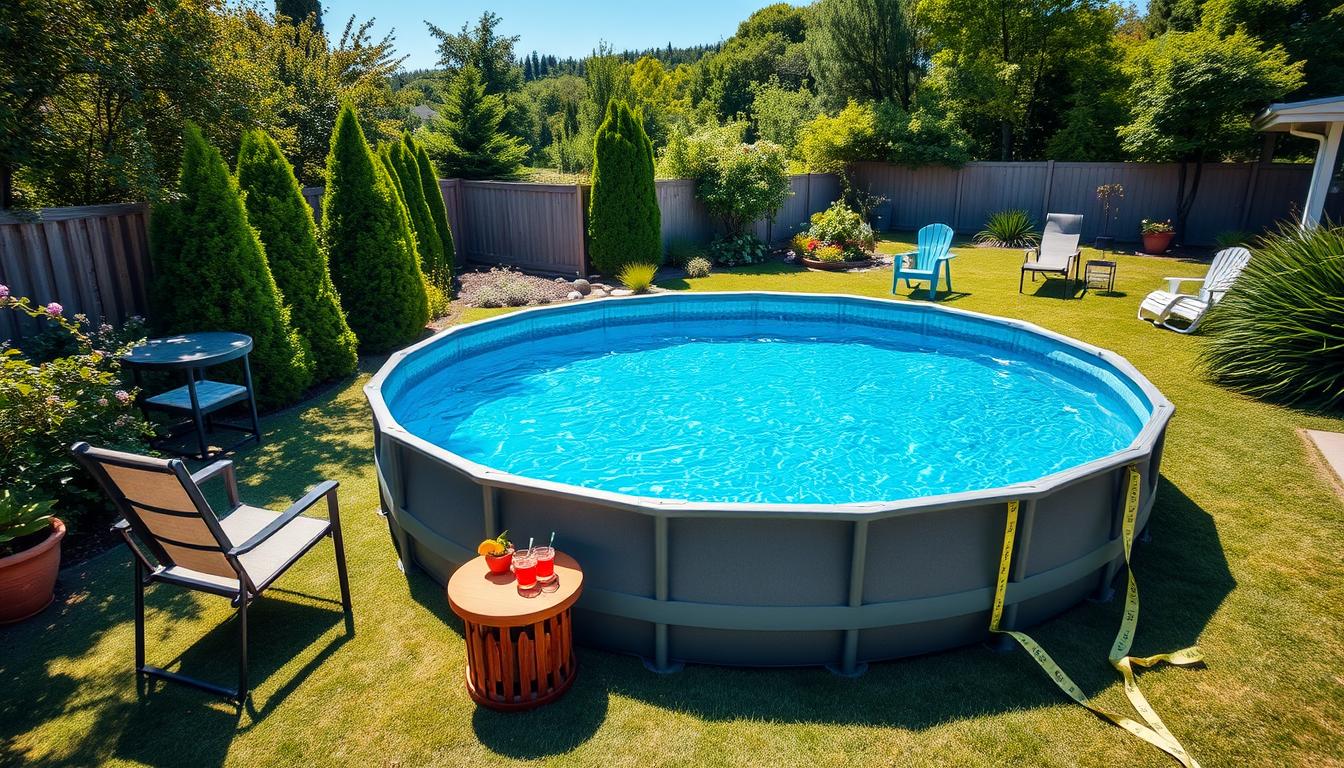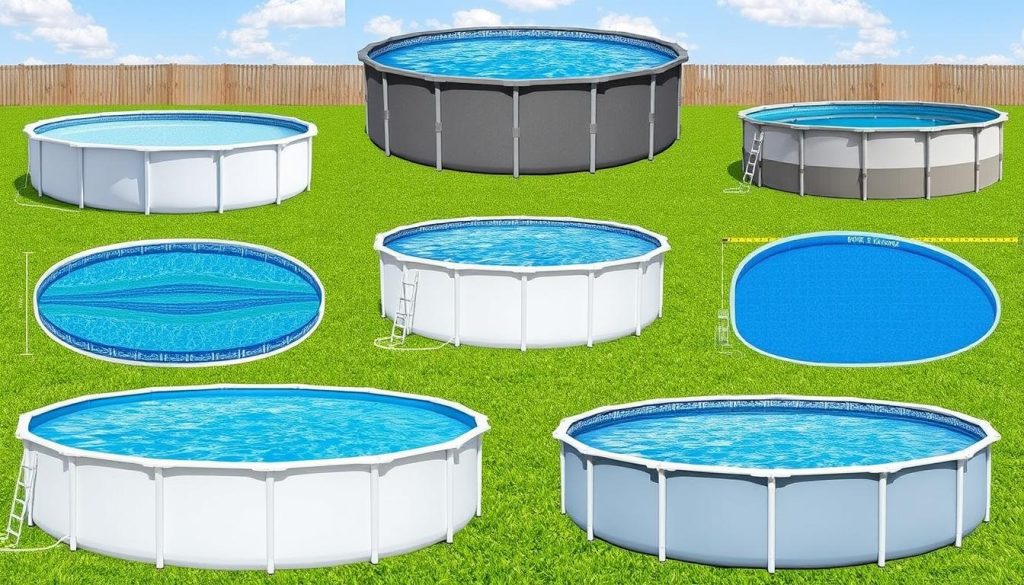
A 33 ft round above ground pool with a 54″ wall height holds 28,789 gallons of water. That’s like filling 43 standard bathtubs! Knowing your pool’s gallon capacity is vital for safe swimming.
Pool size and shape affect water volume, chemical needs, and equipment efficiency. These factors also influence filling and upkeep costs.
Calculating your above ground pool’s volume is key for maintenance and budgeting. Specific formulas and pool volume calculators help determine gallon capacity for round or oval pools.
Using these tools and knowing your pool’s dimensions ensures proper chemical use. It also helps run pool equipment efficiently and make smart decisions about water usage.
Key Takeaways
- Above ground pool gallon capacity varies significantly based on pool size and shape
- Understanding your pool’s volume is essential for proper maintenance and budgeting
- Different formulas exist for calculating the gallon capacity of round and oval pools
- Pool volume calculators can simplify the process of determining your pool’s water volume
- Knowing your pool’s gallon capacity helps you make informed decisions about water usage, chemical treatment, and equipment efficiency
Understanding Above Ground Pool Sizes and Shapes
Above ground pools come in round and oval shapes. Each shape has its own benefits. You can choose the best pool for your yard and water needs.
Round pools are versatile and easy to install. Oval pools work well in narrow yards. Your choice depends on your space and preferences.
Common Round Pool Sizes and Capacities
Round pools are popular among homeowners. They come in various sizes for different yards and swimmer numbers. Here are some common round pool sizes:
| Pool Diameter | Wall Height | Water Capacity (Gallons) |
|---|---|---|
| 18 feet | 52 inches | 7,646 |
| 21 feet | 52 inches | 10,573 |
| 24 feet | 52 inches | 13,594 |
| 27 feet | 52 inches | 17,205 |
| 30 feet | 52 inches | 21,240 |
Consider your yard space when picking a pool size. Think about how many swimmers you’ll have. Remember, bigger pools need more water and chemicals.
Oval Pool Dimensions and Gallon Capacities
Oval pools are great for long, narrow yards. They offer more swimming space in a smaller area. Here are some popular oval pool sizes:
| Pool Dimensions | Wall Height | Water Capacity (Gallons) |
|---|---|---|
| 12′ x 24′ | 52 inches | 8,602 |
| 15′ x 30′ | 52 inches | 13,947 |
| 18′ x 33′ | 52 inches | 19,131 |
Oval pools need extra support structures. Plan for space around the pool for these supports. Leave room for decking and landscaping too.
Know your pool options before making a choice. Round or oval, pick the pool that fits your yard best. Create a backyard oasis your family will love for years.
Calculating Gallons in Your Above Ground Pool
Knowing your pool’s gallon count is crucial for safe swimming. It helps maintain proper water chemistry. Let’s explore how to calculate your pool’s volume based on its shape and size.
Formulas for Determining Pool Volume
For rectangular or square pools, use this formula:
Volume (in gallons) = Length (ft) × Width (ft) × Average Depth (ft) × 7.5
Circular or oval pools require a different calculation:
Volume (in gallons) = π × Radius (ft) squared × Average Depth (ft) × 7.5
Average depth is the sum of shallow and deep end depths divided by two. The factor 7.5 represents gallons in one cubic foot of water.
Using a Pool Volume Calculator
Online pool volume calculators simplify the process. They estimate gallons in your above ground pool. Locey Swim & Spa offers one such tool.
Remember, these calculators provide estimates, not precise measurements. Always check manufacturer specifications for accurate pool volume. Consult professionals before adjusting chemical levels for safety.
Factoring in Depth Variations
Consider depth variations when calculating pool volume. Many pools have gradual slopes from shallow to deep ends. This affects the average depth used in volume formulas.
To account for depth variations, try these methods:
| Method | Description |
|---|---|
| Measure multiple depths | Take depth measurements at several points along the pool’s length and calculate the average depth based on these measurements. |
| Divide the pool into sections | If your pool has distinct shallow and deep areas, calculate the volume for each section separately and add them together. |
| Consult professional measurements | Refer to the pool manufacturer’s specifications or have a professional measure your pool’s volume for the most accurate results. |
Accurate depth calculations ensure precise pool volume measurements. This helps maintain proper water chemistry. Enjoy a safe and fun swimming experience in your well-maintained pool.
How Many Gallons in an Above Ground Pool: Real-World Examples
Let’s explore some real-world examples of above ground pool sizes and their water volumes. These examples will help you understand pool sizing better. They show how pool dimensions relate to gallon capacity.
15ft Round Pool with 52″ Wall Height: 5,724 Gallons
A 15-foot round above ground pool with a 52-inch wall height holds about 5,724 gallons. This size offers a spacious swimming area with manageable water volume. It’s easier to maintain proper water chemistry in this pool.
18ft Round Pool with 54″ Wall Height: 8,565 Gallons
An 18-foot round pool with a 54-inch wall height holds 8,565 gallons. This larger pool provides ample space for swimming and playing. It’s great for families or those who like hosting pool parties.

21ft x 43ft Oval Pool with 54″ Wall Height: 30,395 Gallons
A 21-foot by 43-foot oval pool with a 54-inch wall height holds 30,395 gallons. This sizeable pool offers a vast swimming area. It’s perfect for lap swimming and water games.
| Pool Size and Shape | Wall Height | Gallon Capacity |
|---|---|---|
| 15ft Round | 52″ | 5,724 gallons |
| 18ft Round | 54″ | 8,565 gallons |
| 21ft x 43ft Oval | 54″ | 30,395 gallons |
These examples show how gallon capacity varies among different above ground pool sizes and shapes. Knowing your pool’s water volume is crucial. It helps maintain proper water chemistry and calculate chemical dosages.
The Importance of Knowing Your Above Ground Pool’s Gallon Capacity
Knowing your pool’s gallon capacity is vital for proper maintenance. It helps you add the right amount of chemicals for safe swimming. This knowledge prevents over or under-chlorination, which can cause irritation or damage equipment.
Understanding your pool’s volume helps optimize energy use when heating. You can avoid wasting money by heating only the necessary amount of water. It’s also crucial for setting up an effective filtration cycle.
Proper filtration keeps water clear and stops harmful bacteria growth. During pool construction, knowing the capacity ensures compliance with local regulations. This prevents costly changes later on.
Being informed about your pool’s volume is key to responsible ownership. It helps create a safe and fun swimming environment for everyone. With this knowledge, you can maintain your pool effectively and enjoy it worry-free.







